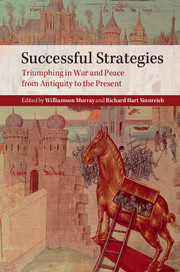Book contents
- Frontmatter
- Dedication
- Contents
- List of tables and map
- List of contributors
- Acknowledgments
- Introduction
- 1 The strategic thought of Themistocles
- 2 The grand strategy of the Roman Empire
- 3 Giraldus Cambrensis, Edward I, and the conquest of Wales
- 4 Creating the British way of war: English strategy in the War of the Spanish Succession
- 5 Failed, broken, or galvanized?
- 6 Victory by trial and error: Britain’s struggle against Napoleon
- 7 The strategy of Lincoln and Grant
- 8 Bismarckian strategic policy, 1871–1890
- 9 Dowding and the British strategy of air defense 1936–1940
- 10 US naval strategy and Japan
- 11 US grand strategy in the Second World War
- 12 American grand strategy and the unfolding of the Cold War 1945–1961
- 13 The Reagan administration’s strategy toward the Soviet Union
- Afterword
- Index
- References
8 - Bismarckian strategic policy, 1871–1890
Published online by Cambridge University Press: 05 June 2014
- Frontmatter
- Dedication
- Contents
- List of tables and map
- List of contributors
- Acknowledgments
- Introduction
- 1 The strategic thought of Themistocles
- 2 The grand strategy of the Roman Empire
- 3 Giraldus Cambrensis, Edward I, and the conquest of Wales
- 4 Creating the British way of war: English strategy in the War of the Spanish Succession
- 5 Failed, broken, or galvanized?
- 6 Victory by trial and error: Britain’s struggle against Napoleon
- 7 The strategy of Lincoln and Grant
- 8 Bismarckian strategic policy, 1871–1890
- 9 Dowding and the British strategy of air defense 1936–1940
- 10 US naval strategy and Japan
- 11 US grand strategy in the Second World War
- 12 American grand strategy and the unfolding of the Cold War 1945–1961
- 13 The Reagan administration’s strategy toward the Soviet Union
- Afterword
- Index
- References
Summary
This phenomenon of a political genius of German stock, who in three bloody wars created the Prussian-German realm of power and for decades secured for it the hegemony in Europe – a hysterical colossus with a high voice, brutal, sentimental, and given to nervous spasms of weeping . . . a giant of fathomless cunning and . . . cynical frankness of speech . . . contemptuous of people and overwhelming them with charm or force, careerist, realist, absolute anti-ideologist, a personality of excessive and almost superhuman format who, filled with himself, reduced everything about him to adulation or trembling . . .
At the mere mention of a political opponent, his look was that of an angry lion. Gargantuan in his appetites, he devoured half a henturkey at dinner, drank half a bottle of cognac and three bottles of Apollinaris with it, and smoked five pipes afterwards . . . Like Luther, he took a passionate joy in hating, and with all of the European polish of the aristocratic diplomat he was, like him, Germanic and anti-European . . . Revolutionary and at the same time the product of the enormous powers of reaction, he left liberal Europe, thanks to the success of his seasoned Machiavellianism, in the most complete disarray and in Germany strengthened the servile worship of power to the same degree as he weakened faith in tenderer, nobler human ideas and values.
- Type
- Chapter
- Information
- Successful StrategiesTriumphing in War and Peace from Antiquity to the Present, pp. 214 - 240Publisher: Cambridge University PressPrint publication year: 2014

